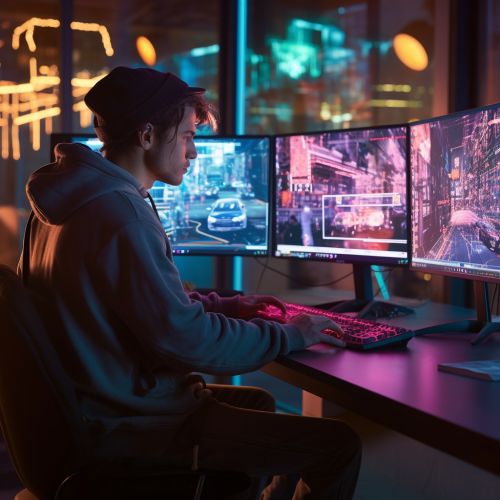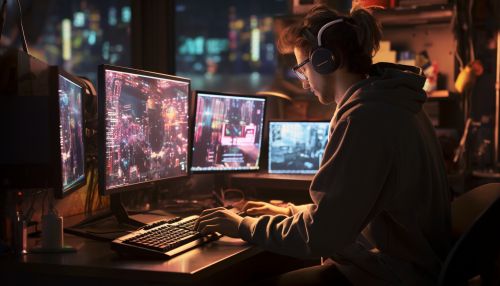Video game programmer
Overview
A video game programmer is a software engineer who specializes in developing video games. They are integral to the creation of video games, contributing to the design, development, and maintenance of the game's software infrastructure. Video game programmers work in a variety of programming languages, such as C++, Java, and Python, and utilize various game development frameworks and engines, like Unity and Unreal Engine.


History
Video game programming has its roots in the early days of computers. In the 1950s and 1960s, computer scientists began creating simple games as part of their research or for fun. The first video games, such as Spacewar! and Pong, were programmed in assembly language, a low-level programming language that is specific to a particular computer architecture.
The 1980s saw the rise of home computers and the personal computer revolution, leading to a boom in the video game industry. During this period, video game programmers often worked alone or in small teams, writing both the game code and the game design. This era gave birth to many classic video games, such as Pac-Man and Super Mario Bros..
The 1990s and 2000s saw the rise of 3D graphics and the internet, leading to a new era of video game programming. Video game programmers now work in large teams, often in specialized roles, and use high-level programming languages and sophisticated game engines. This era has seen the creation of many popular video games, such as World of Warcraft and Grand Theft Auto V.
Roles and Responsibilities
Video game programmers have a variety of roles and responsibilities, depending on their specialization within the field. Some of the key roles include:
Gameplay Programmer
A gameplay programmer focuses on implementing the game's mechanics and rules. They work closely with the game designers to bring their vision to life, coding the interactions, controls, and behaviors that define the game.
Graphics Programmer
A graphics programmer specializes in developing the code that renders the game's visuals. They work with artists and animators to create the game's look and feel, implementing the algorithms and techniques that draw the game's characters, environments, and effects.
AI Programmer
An AI programmer is responsible for coding the behavior of non-player characters (NPCs) in the game. They develop the algorithms that control the NPCs' actions, making them appear intelligent and responsive to the player's actions.
Network Programmer
A network programmer focuses on the code that allows players to compete or cooperate online. They work on the implementation of the game's multiplayer features, ensuring that the game runs smoothly and securely over the internet.
Tools Programmer
A tools programmer develops the software tools that the game development team uses to create the game. These tools can include level editors, animation tools, and debugging tools.
Audio Programmer
An audio programmer is responsible for implementing the game's sound effects, music, and voiceovers. They work with sound designers and composers to integrate audio into the game, ensuring that it enhances the game's atmosphere and gameplay.
Programming Languages and Tools
Video game programmers use a variety of programming languages and tools, depending on the platform and the requirements of the game. Some of the most commonly used languages and tools include:
C++
C++ is a high-level programming language that is widely used in video game development. It offers a high degree of control over system resources, making it ideal for games that require a lot of computational power.
Java
Java is another high-level programming language that is commonly used in video game development. It is particularly popular for mobile game development, due to its portability across different platforms.
Python
Python is a high-level programming language that is often used for scripting in video games. It is known for its simplicity and readability, making it a good choice for prototyping and tool development.
Unity
Unity is a game development engine that is widely used in the video game industry. It provides a range of tools and features for developing games, including a powerful graphics engine, a physics engine, and a visual scripting system.
Unreal Engine
Unreal Engine is another popular game development engine. It offers a range of advanced features, including a high-quality graphics engine, a visual scripting system, and a suite of development tools.
Education and Career Path
Becoming a video game programmer typically requires a bachelor's degree in computer science, software engineering, or a related field. Some universities and colleges offer specialized programs in video game development, which provide a more focused education in the field.
In addition to formal education, aspiring video game programmers often gain experience by creating their own games or contributing to open-source game projects. This practical experience can be invaluable in developing the skills and portfolio needed to break into the industry.
Once in the industry, video game programmers can advance their careers by specializing in a particular area of game development, such as graphics programming or AI programming. They can also move into leadership roles, such as lead programmer or technical director.
Challenges and Future Trends
Video game programming is a challenging field that requires a high level of technical skill and creativity. Programmers must constantly keep up with the latest advances in technology and game design, and must be able to work effectively in a team environment.
Future trends in video game programming include the increasing use of virtual reality (VR) and augmented reality (AR) technologies, the rise of mobile gaming, and the growing importance of online multiplayer features. These trends are likely to create new challenges and opportunities for video game programmers in the years to come.
